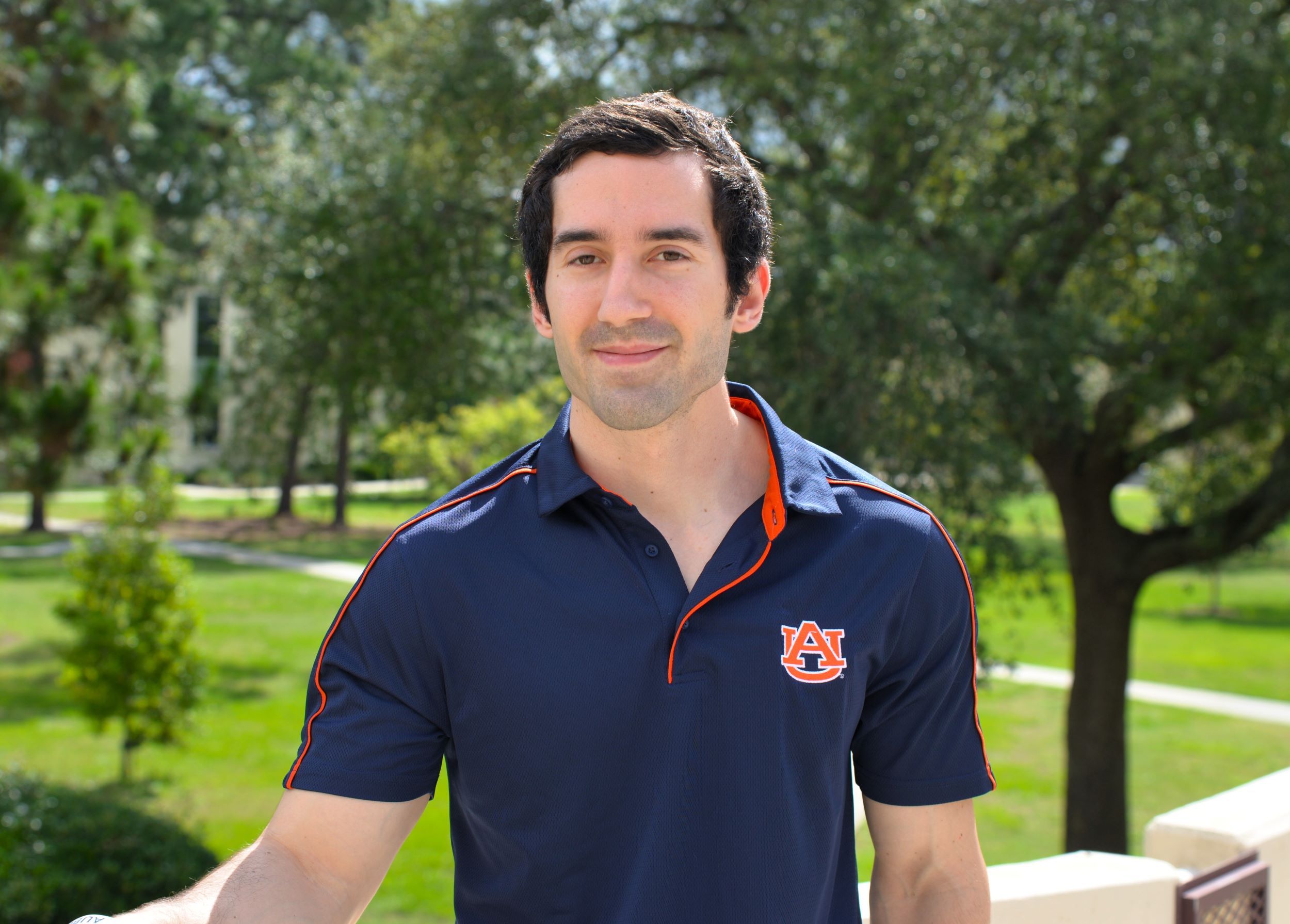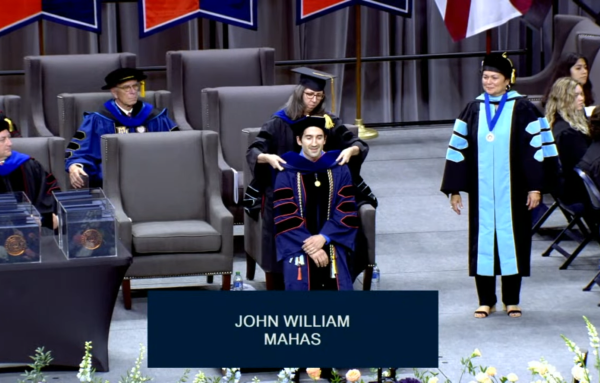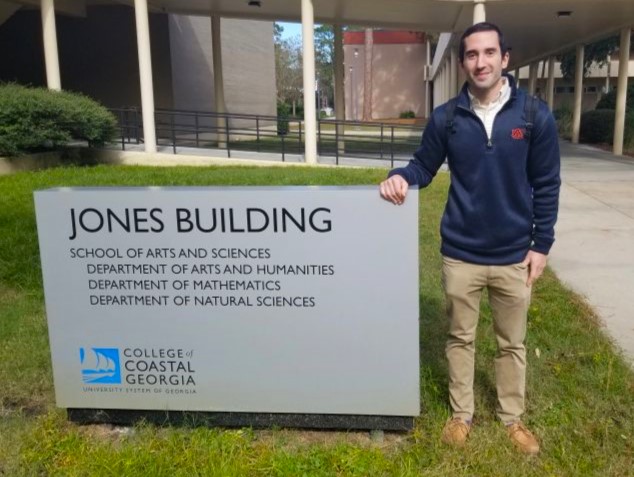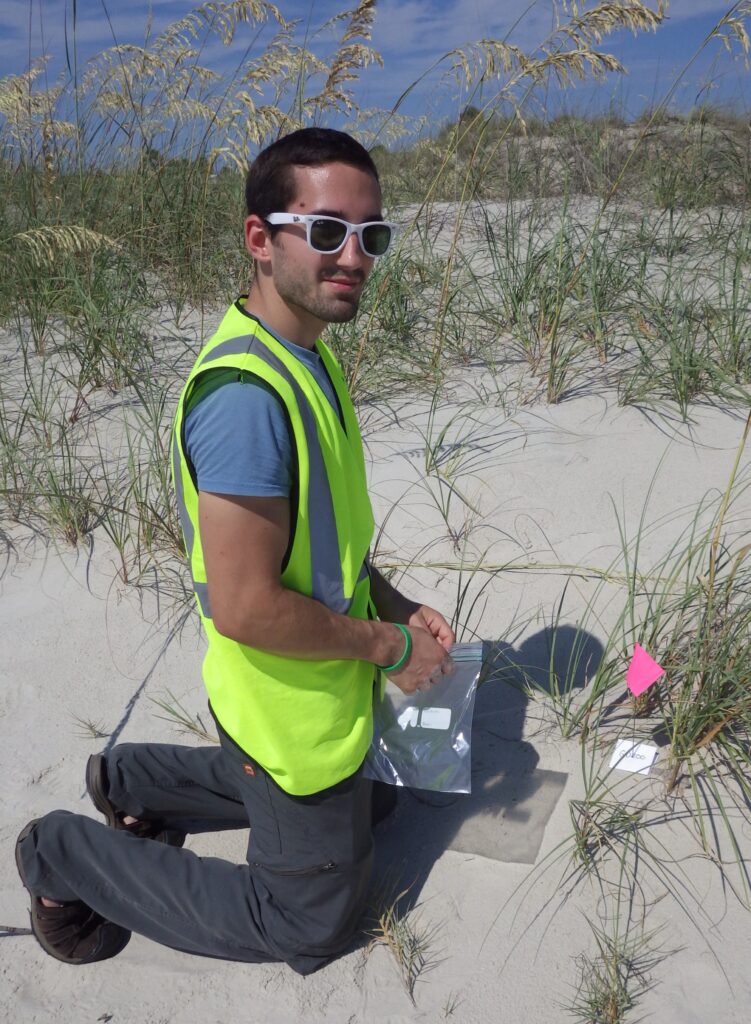
Finding His Focus
John Mahas ’16 graduated this spring with a Ph.D. in entomology from Auburn University, and has now started a postdoc position at Cornell University. Mahas’ journey to this accomplishment started at the College of Coastal Georgia, where he discovered the type of research he was interested in exploring.
The Brunswick native enrolled at the College of Coastal Georgia after earning his GED through the Adult Literacy Center. His initial plan was to earn an associate degree in biology, transfer to another institution, and eventually become a veterinary technician. While volunteering at a veterinarian hospital, Mahas realized a career in veterinary medicine wasn’t for him. However, he was still interested in doing research with animals and studying their habitats. Mahas made the decision to stay at Coastal and went on to earn a bachelor’s in biology with a concentration in ecology.
“I developed more of an interest in ecology, which is essentially the study of how an organism interacts with the environment, and I wanted to do that with animals,” he said.
Mahas honed in his interest further through an internship with the Georgia Sea Turtle Center and a research project with Dr. Tate Holbrook, professor of biology. For the project, Mahas and other students investigated predatory fire ants invading loggerhead turtle nests on Jekyll Island. They developed some ideas on the driving factors of fire ant predation in the nests.
“I think the ants were interested in the mucus that surrounds the eggs in the nests. In some cases, they could also attach to the sea turtles that are leaving the nests who may still have mucus on them,” Mahas said.
Through his internship at the Georgia Sea Turtle Center, Mahas observed ants going into the nests. He collected the ants and recorded the data.

“We were also able to quickly do an emergency excavation because they (ants) had gotten to the nest earlier than anticipated,” he said. “We got into the nests and did an inventory to rescue any remaining hatchlings.”
Their research was subsequently published—a great accomplishment for any undergraduate student.
Holbrook’s classes were Mahas’ favorite, not only because of the focus on ecology, but also because of the different opportunities to learn outside of the classroom.
“There were a number of times that we went into the marsh to collect data on things, like the vegetation, trees, other forested areas, and we did some work with snails. We even went to the zoo one time to observe different animal behaviors,” he said.
Mahas’ time at Coastal gave him a good foundation in biology and ecology. When looking into different master’s programs, he knew he wanted to be a part of a program that spoke to his interests in entomology (the study of insects), ecology, and management. While doing his search, he found the advisor he’s come to work with for the past six years.
“She was primarily doing entomology work, ecology, and management with different crops. I never worked with crops before. Being from the coast, I only focused on coastal issues. Her work still had the ecology, management aspect to it, which is what I’m most interested in,” he said. “We ended up chatting together and she offered me a position as a master’s student.”
Mahas then began his journey as a graduate research assistant at Auburn University. His graduate research focused on the crop pest cotton aphid (Aphis gossypii Glover) and cotton. Aphids are small insects—about the size of a pin head—that feed on plant leaves and can cause damage. As the name suggests, cotton aphids feed on cotton plants affecting crop production, and are able to transmit cotton leafroll dwarf virus (CLRDV) to the plants. Mahas said it is a fairly new virus, having only been reported in the United States since 2017.
“My master’s research focused on how we could more effectively manage for the virus in cotton,” he said. “Cotton aphids feed on a plant that has the virus, then they carry it as they feed on another plant. The saliva from the pests gets inside the plant and infects it.”
For his doctorate program, Mahas focused on the ecology of the insect, the epidemiology of the virus, and the spread of the virus in the landscape. He did a meta-analysis on cotton aphid research, explored where aphids were picking up the virus, and factors that are driving and influencing the number of aphids in fields. He monitored aphids from North Carolina to Texas, and collected data from collaborators across the states.
“We found that areas with higher cotton production and warmer temperatures were areas where there were more virus incidents occurring in the cotton fields,” he said. “We also saw that in warmer areas, there were more aphids in the cotton fields.”

John Mahas being hooded after earning his doctorate at Auburn University.
After successfully defending his thesis entitled, “Assessing the Spread and Movement of Cotton Leafroll Dwarf Virus and Cotton Infesting Aphids in the Southern U.S.” Mahas was offered a postdoc position at Cornell University, where he will gain more experience in performing and leading research. Mahas will now focus on a new crop and crop pest—corn and the corn earworm. The corn earworm transforms into a moth as an adult and will lay eggs on corn silk. When the eggs hatch, the insect develops and will feed on the corn. If you’ve ever seen a little caterpillar on corn at the grocery store or farmer’s market, or notice some kernels missing, it could be due to the corn earworm, Mahas said. His postdoc research will focus on managing the insect, and understanding its biology and ecology.
“There are a number of different applications for when you use biology and ecology to help manage crops in a more sustainable, economically sound manner. If a farmer sprays five times in a field and research shows that you can get the same yield by doing two applications instead of five, then that saves that farmer time and money as well,” Mahas said.
Mahas’ goals for the near-future are focused on his new position, however, he is keeping his options open for later. He can picture himself working as a professor with a teaching appointment, research appointment, or an extension appointment. He would also consider working for a company that does research to produce a product that helps manage crop pests. Mahas is also open to becoming a professor like Holbrook and teaching the next generation of scientists and researchers. No matter where his future may lead, Mahas knows that it will involve ecology, crop pests, and management in some sort of way.
For Holbrook, Mahas’ success is a testament to his deep passion for biology and tireless work ethic.
“He was a super-achiever as an undergrad, completing multiple internships and independent research projects on top of his coursework, clubs, jobs, etc.,” Holbrook said. “I’m not surprised he went on to complete his Ph.D. and land a prestigious postdoc, but I am very proud of him!”
Holbrook shared that Mahas has stayed connected to the Coastal community. Mahas has presented at the Department of Natural Sciences Seminar and has been a guest lecturer in Holbrook’s Invertebrate Natural History class.

John Mahas came back to campus to present his doctorate research and share his graduate school experiences with students.
“In this way, John has helped inspire other Coastal students to make the most of their college experience and to set their sights high after graduation,” Holbrook said.
Make the Most of Your Time
Mahas truly does encourage students to make the most of their time while they are in college.
“If you can get additional experience, not just with your coursework, but if you’re able to do some internships, that can be very helpful,” he said. “Doing research projects where you can generate something for publication, especially if you’re interested in graduate school, can be beneficial too.”

Mahas also advised students to reach out to their current professors for information on graduate school and also contact professors at institutions where they are interested in studying.
“Don’t be afraid to reach out and ask them about different opportunities. The worst they can do is not email back, or just say no,” Mahas said. “Don’t be afraid to follow-up if you don’t hear back. They get hundreds of emails a day. Make yourself stand out in those emails as well.”
Getting involved in student organizations is also a benefit for students, Mahas said.
“Participating in clubs gives you leadership experience. You learn how to talk with others, especially if you haven’t done much of that before,” he said. “It’s a good starting place.”
At Coastal, Mahas was a member of the Biology Club and the founding secretary of the Environmental Club. Through his extracurricular activities, he met his now wife, Jessica. They initially met through the Biology Club, then when she and other students wanted to start the Environmental Club, he followed. She also graduated with a bachelor’s in biology with a focus in coastal ecology, and went on to earn a master’s in forestry and entomology at Auburn University. Mahas is a great example of what can happen when one steps out of their comfort zone.
Even when he’s not doing research, Mahas can’t get away from being around nature. He and his wife enjoy going to different state parks, where they go hiking and take nature walks.
Mahas also has three siblings currently at the College and another sibling who graduated last year.






